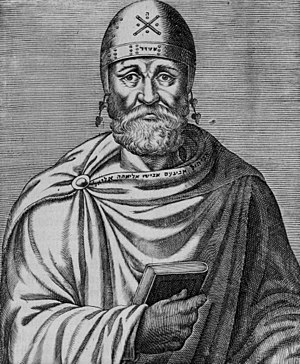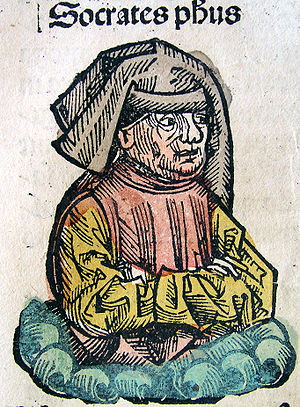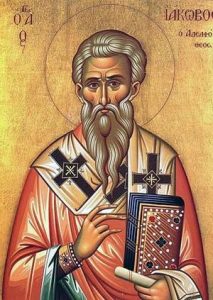Continued from “The Brother of Jesus called Christ”: another Eusebian footprint in Josephus? . . . . (arguing reasons to believe the “called Christ” reference in book 20 of Antiquities by Josephus was not original to Josephus)
Writing his commentary on Matthew around the 220’s, and in reference to James, Origen gives us our first extant reference to the phrase, “the brother of Jesus who is called Christ”. In later years he repeated it twice in his Contra Celsum. (See previous post for the translated extracts.) In each of these three passages Origen claims that Josephus tells us that the fall of Jerusalem was punishment for a Jewish mob murdering the Just James, the brother of Jesus called Christ.
Josephus, on the other hand, in Book 20, says nothing more than that James, with some companions, was unjustly executed by the high priest through an illegal calling of judges; the point of J’s story is to describe reasons for the fall and replacement of a wicked high priest, and there is no linkage to the destruction of Jerusalem.
There are two questions that the three passages in Origen raise:
Question 1: Origen said that the passage was in the writings of Josephus, but where in Josephus? It is not there in our copies.
Question 2: The phrase itself does appear, with an inverted twist, in Book 20 of Antiquities by Josephus, but the story about James there is not the same as the one Origen relates, and the context makes it extremely unlikely the story could ever have been there (see previous post for summary of reasons). Do we have a merely coincidental duplication of the phrase in contexts so alike and yet especially so unlike? Origen’s account could hardly have been part of the Book 20 reference we have in Josephus today for the following reasons:
- In the Josephan passage the villain is the high priest and the general public are so outraged by his actions (not only against James but also against his companions) that they initiate actions that force his removal and replacement by another (Jesus the son of Damneus); yet in Origen’s story of James the Just being martyred, the Jews fully support and participate in the murder of James.
- also Origen’s story of a Christian James does not make sense in the Josephan passage — why would murdering a despised Christian outrage the Jewish nation?
- and Origen’s James is also renowned for his scrupulous adherence to the law, so on what grounds would Ananias have had him murdered as a law-breaker?
Josephus confused with Hegesippus?
Eusebius gives us reasons for suspecting Origen had actually read or heard the story of the martyrdom of James from Hegesippus, but by the time he came to write about it, had confused Hegesippus with the similar sounding Josephus. This would explain why Origen did not say where in Josephus’s writings the account was to be found. From Book 2, chapter 23 of his Church History:
3. The manner of James’ death has been already indicated by the above-quoted words of Clement, who records that he was thrown from the pinnacle of the temple, and was beaten to death with a club. But Hegesippus, who lived immediately after the apostles, gives the most accurate account in the fifth book of his Memoirs. He writes as follows . . . .
19. These things are related at length by Hegesippus, who is in agreement with Clement. James was so admirable a man and so celebrated among all for his justice, that the more sensible even of the Jews were of the opinion that this was the cause of the siege of Jerusalem, which happened to them immediately after his martyrdom for no other reason than their daring act against him.
Eusebius indicates here that the story of James’ death that we read in Origen was [also? really?] found in the 5th book of Memoirs by Hegesippus.
But we know Eusebius had also read Origen, and that Origen wrote that the account was found in Josephus, although he does not tell us where in Josephus. Is this why Eusebius continues his account of James from Hegesippus with the following:
20. Josephus, at least, has not hesitated to testify this in his writings, where he says, “These things happened to the Jews to avenge James the Just, who was a brother of Jesus, that is called the Christ. For the Jews slew him, although he was a most just man.”
Again, Josephus is named as a source, but again, there is no indication of where in Josephus this account is to be found. It is possible that Eusebius was attempting here to add weight to the story by his reference to what he had read in Origen. It seems he was not referring to Josephus himself here, since he seems as ignorant as Origen re where Josephus wrote this.
This suspicion is reinforced by the very next words of Eusebius where he does tell us exactly where in Josephus to find the current passage we know about James, and quotes him:
21. And the same writer records his death also in the twentieth book of his Antiquities in the following words: But the emperor, when he learned of the death of Festus, sent Albinus to be procurator of Judea. But the younger Ananus, who, as we have already said, had obtained the high priesthood, was of an exceedingly bold and reckless disposition. He belonged, moreover, to the sect of the Sadducees, who are the most cruel of all the Jews in the execution of judgment, as we have already shown.
22. Ananus, therefore, being of this character, and supposing that he had a favorable opportunity on account of the fact that Festus was dead, and Albinus was still on the way, called together the Sanhedrin, and brought before them the brother of Jesus, the so-called Christ, James by name, together with some others, and accused them of violating the law, and condemned them to be stoned.
The earliest attestation of the Josephan “brother of Jesus called Christ” phrase
The pre-Eusebian silence on the James passage which refers to “Jesus called Christ” is not as strange as the silence regarding the fuller reference to Jesus in Book 18 (the Testimonium Flavianum), as I think Doherty remarks, but it does remain a question to be answered nonetheless.
What we do find are pre-Eusebian references to a very similar phrase, only found in a more natural word order, in connection with a story of the death of James (the Lord’s brother) that is by Origen attributed to Josephus and by Eusebius attributed to Hegesippus. (We also have Jerome’s even later testimony, but that is another story altogether. See Doherty’s discussion for an intro.) That story is not in our copies of Josephus, and we are not told by ancients where in Josephus it should be found. But we are given a detailed title and chapter/book number for a reference to the same story by Hegesippus, an author with a similar sounding name to Josephus.
Comparing the natural and unnatural word order
All the pre-Eusebian citations of the phrase about James present it in the natural order with James named first, with the explanation of who he is following:
James, the brother of Jesus called Christ
Only in Book 20 of Eusebius do we have the oddity of the high priest bringing charges against
the brother of Jesus called Christ, James by name . . . .
In my previous post I outlined the reasons why Josephus would have been unlikely to have attempted to remind readers who Jesus was by such a phrase.
But the Josephan phrase would not necessarily be unnatural at all, in fact would make good sense, if the words “called Christ” were omitted. It would be consistent with Josephus’s practice at other places to introduce a character without description until later in the narrative, as remarked by Shaye Cohen, David Hindley and Steve Mason:
Shaye Cohen (Josephus in Galilee and Rome) states: “The uneven method of introducing and re-introducing characters and places is particularly conspicuous in Vita (“Life”). Cestius Gallus, the governor of Syria is mentioned first in Vita 23 but his title does not appear until Vita 30….Jesus ben Sapphia is introduced in Vita 134 as if he were a new character although he appeared at least once before….We meet Ananias, a member of the delegation, in Vita 197, but Josephus describes him in Vita 290 as if for the first time….Any deductions about Josephus’ sources based on these inconsistencies are unreliable.”—quoted on an IIDB forum by D. C. Hindley, who comments: “Josephus, for the most part, does identify new characters (either by naming family relationships and/or significance for a particular location) at first introduction (at least those named Jesus), but also can be inconsistent in introducing and re-introducing characters. I can only propose that AJ 20.200 might represent such a case.” Steve Mason also had this to say in an email posted on the IIDB: “…The Iēsous in Tiberias (Life, 271) is the archon, or council-president ([not stated until] 278-79)—a case of mentioning the name shortly before giving the identification. That also happens occasionally in [Jewish] War. I have wondered whether it is not a deliberate narrative technique: provoking the reader to wonder who this guy is, and then supplying the identification after a few sentences…” (Footnote 23 in Josephus on the Rocks)
And if Jesus was not identified by “called Christ” in this passage in Josephus, he would most logically be the same Jesus who, after the execution of James, was made the new high priest.
21. And the same writer records his death also in the twentieth book of his Antiquities in the following words: But the emperor, when he learned of the death of Festus, sent Albinus to be procurator of Judea. But the younger Ananus, who, as we have already said, had obtained the high priesthood, was of an exceedingly bold and reckless disposition. He belonged, moreover, to the sect of the Sadducees, who are the most cruel of all the Jews in the execution of judgment, as we have already shown.
22. Ananus, therefore, being of this character, and supposing that he had a favorable opportunity on account of the fact that Festus was dead, and Albinus was still on the way, called together the Sanhedrin, and brought before them the brother of Jesus, , James by name, together with some others, and accused them of violating the law, and condemned them to be stoned.
23. But those in the city who seemed most moderate and skilled in the law were very angry at this, and sent secretly to the king, requesting him to order Ananus to cease such proceedings. For he had not done right even this first time. And certain of them also went to meet Albinus, who was journeying from Alexandria, and reminded him that it was not lawful for Ananus to summon the Sanhedrin without his knowledge.
24. And Albinus, being persuaded by their representations, wrote in anger to Ananus, threatening him with punishment. And the king, Agrippa, in consequence, deprived him of the high priesthood, which he had held three months, and appointed Jesus, the son of Damnæus.
Eusebius, it appears, knew nothing more than the above passage (the quotation is from his Church History), and in his desire to make the extant copies of Josephus really say something about the death of the Christian leader and brother of Jesus Christ, inserted the phrase, called Christ, after Jesus.
Anomalies and Best Sense
This insertion created the following anomalies in the present text:
- it is a reference to Jesus Christ as unknown before Eusebius as the larger reference to Jesus in book 18 of Antiquities
- it is inconsistent with the way Josephus normally re-introduced characters after their last mention being some time earlier
- it leaves unexplained why this James (supposedly renowned for his law-based life yet charged with breaking the law?) was murdered
- it is inconsistent with the other accounts of James being a Christian (the high priest would not have been so unpopular if James had been a Christian)
- it is inconsistent with the other accounts of a large gang of Jews collectively murdering him along with their leaders (with no reference to Ananus either)
- it would be one of only 2 places in all of Josephus’s works where he says someone was said to be a Messiah or Christ — not even other clearly would-be messiahs were so described by Josephus
- it creates an unusual word order — why would a passage about the wickedness of Ananus, with James as a target of his wickedness, be introduced by reference to a relative of that target, especially if Christ was not originally used in the book 18 passage earlier
Without the phrase “called Christ” the passage (even its strange word-order placing the reference to Jesus first before his brother James) makes perfect sense, consistent with Josephan style elsewhere, of the background machinations to the murder of James; it was his brother, Jesus, who was ironically (and/or via some longstanding power game) who was made the new high priest. James was the “bit player” in the drama (a certain James by name — no need for further elaboration it seems), the unfortunate target that led to the fall of Ananus and his replacement by his brother, Jesus. But this was not the Jesus called Christ, but one of 20 other Jesus’s in Josephus.
A Christian phrase
The Greek phrase for “called Christ” —tou legomenou Christou — furthermore, ‘just happens’ to be used in the canonical gospels of Jesus, in particular that most popular of all gospels in the second century, Matthew, and in Justin Martyr’s writings.
Matthew 1:16
And Jacob begot Joseph the husband of Mary, of whom was born Jesus who is called Christ (ho legomenos Christos).
Matthew 27:17
Therefore, when they had gathered together, Pilate said to them, “Whom do you want me to release to you? Barabbas, or Jesus who is called Christ?”
Matthew 27:22
Pilate said to them, “What then shall I do with Jesus who is called Christ?” They all said to him, “Let Him be crucified!”
John 4:25
The woman said to Him, “I know that Messiah is coming” (who is called Christ). “When He comes, He will tell us all things.”
Justin Martyr, First Apology, 30:
But lest any one should meet us with the question, What should prevent that He whom we call Christ (ton par’ hēmin legomenon Christon), being a man born of men, performed what we call His mighty works by magical art, and by this appeared to be the Son of God? we will now offer proof . . .
As Doherty points out, the latter two occasions here (John and Justin) indicate the phrase had become a formula of some kind. (See his online discussion for details.)
And if the phrase was used by Hegesippus, then we have yet another instance of its Christian usage.
All this, of course, increases the likelihood that the phrase was something more likely to have been inserted by a Christian into Josephus.
Like this:
Like Loading...





